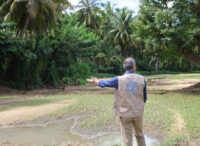Two of Sri Lanka’s flagship export industries, tea and rubber, are facing growing turmoil as the United States prepares to impose a steep 30% tariff on imports from August 1.
The move threatens to derail shipments, disrupt cash flows, and jeopardise thousands of livelihoods, the Planters’ Association of Ceylon (PA) has warned.
Issuing a statement, the Association said the announcement has already caused significant market volatility.
While some U.S. buyers have agreed to clear existing shipments under a temporary 10% duty, uncertainty has gripped exporters, leading to suspended orders and delayed payments.
“As of April 11, nearly 300,000 kg of tea valued at $3.24 million was already en route to the U.S., with another 21,000 kg worth $479,000 awaiting clearance,” the statement noted.
Confirmed orders for an additional 225,970 kg, worth over $3.1 million, were suspended following the April tariff announcement.
Sri Lanka’s tea exporters have been caught off guard, especially as competitor nations such as Vietnam, India, and Indonesia have either entered or are actively negotiating preferential trade agreements with the U.S., giving them a crucial edge in a fiercely competitive market.
“Ceylon Tea has enjoyed duty-free access to the U.S. until now. The sudden imposition of a 30% tariff on such a high-value, premium product could devastate the sector,” the Planters’ Association said.
In 2024, the U.S. imported 6.4 million kilograms of Ceylon Tea worth $45 million, with 65% of it being value-added products, a sign of growing demand for Sri Lankan premium offerings. Former
Tea Exporters Association Chairperson Ganesh Deivanayagam noted that the average FOB price for tea to the U.S. stood at $7 per kilogram, compared to the national average of $5.83, underlining the brand’s premium market position.
The crisis extends beyond tea. Sri Lanka’s rubber exports, worth over $330 million annually, primarily solid tyres, medical gloves, and PPE, are also under threat.
With 80% of solid tyre exports bound for the U.S., several Sri Lankan firms have already paused shipments, fearing a permanent shift by buyers to cheaper sources.
“The 30% tariff renders Sri Lankan products instantly non-competitive,” the statement warned, noting that the rubber sector supports over 150,000 livelihoods and contributes nearly a billion dollars to the national economy.
The Planters’ Association of Ceylon requested the government to urgently engage with the U.S. Trade Representative to negotiate relief for agricultural commodities such as tea and medical-grade rubber.
It also called for short-term safety nets, including duty drawback schemes, worker retraining programmes, and marketing support to soften the immediate blow.











Leave a comment